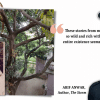‘Listen, don’t forget to send me to Lahore’

I had been attending my new college for only a few months when I heard of an 'Inter-wing' scholarship. Students applying to it would have the opportunity to study in Lahore in West Pakistan. I was determined to see the principal about this, so one day I marched into her office without knocking. When I went in, the principal had her head down, working on some papers on her desk. As I spoke she stared at me, astonished by my temerity, before managing to recover her composure. She instructed me to leave, knock on the door, ask for permission and re-enter. I did so and subsequently expressed to her my interest in applying for the scholarship. She asked me why I wanted to study in Lahore and I told her that I was unhappy in Dhaka as my grandfather and extended family treated me cruelly. She pointed out that my second division results in my Matriculation did not meet the scholarship requirements. I asked her to send my name in nonetheless as I wanted to face the interview board. I will do the rest, I told her. It took some convincing on my part but eventually she said she would.
Apparently she kept her word, as a few weeks following my visit to the principal's office, I was called before the scholarship board. I faced twelve men across a huge oval table. When they asked me why I had managed only a Second Division result in my matriculation I told them that they could ask me questions they considered worthy of first division students and that I would answer them correctly. So they did. One of the questions was about who authored the poem "O Captain! My Captain!". Luckily, I remembered seeing the name by accident in a book whose pages were fluttering in the wind before in my room one day, so I was able to answer: Walt Whitman. Another question was about Eastern classical music, about which raags should be sung at what hour and what different raags I knew. At one point one interviewer even asked me if I could dance as the girls in West Pakistan were very smart and cosmopolitan. Upon being asked this, I got up from my chair and went to the middle of the room. With no musical accompaniment whatsoever, I started gyrating, saying, "Look, I can do the twist", which was in vogue in those days. Embarrassed, the interviewers asked me to sit down, and not long after, told me the interview was over. Although I left the room without even a "thank you" I returned within seconds, sticking my head through the heavy drapes to tell them in English, "Listen, don't forget to send me to Lahore, ok? Remember it!"
I chose not to visit my grandparent's house until I was accepted for the scholarship. The last time I had visited him he asked me to provide an account of the money that I had taken for my hostel expenses. I provided him with a list of accounts that included ten takas worth of grapes. Seeing this, my grandfather wanted to beat me. He viewed my purchase as a huge waste of money. I fled the house and vowed never to return. My parents were far away to the South, in Patuakhali. They were ignorant, perhaps willfully, of the abuse I was enduring at the hands of my grandparents, perhaps even relieved that I was under their surveillance.
Another reason I wanted to escape to Lahore was because I hated hostel life at Home Economics College in Dhaka, and missed my parents terribly. During the day I busied myself with studies the best I could, but at night the thought of my mother made me homesick. Bewildered and sad, unable to sleep, I would sob in my bed for her night after night at the hostel. My roommate, a senior girl, half-asleep herself, would console me when my crying woke her at night. My homesickness was such that I even approached one American teacher and asked her if she would be my mother as she bore a passing resemblance to her, leaving her speechless.
Incredibly, the college authorities informed me after a few weeks that I had been selected for the inter-wing scholarship and would be going to Lahore. Rather than reflect on my good fortune I felt relief that I would no longer be beaten by my grandfather. I hoped that the excitement of a new country would mitigate the pain of missing my mother.
When all the details were finalised I visited my grandfather and his family and told them I was going to Lahore. They were shocked but made the necessary arrangements. On the day of my PIA flight my grandfather took me to the airport to see me off. The biggest thing I took with me was my harmonium, which incurred an enormous 54 taka surcharge at the airport. I carried a small bag with me inside which was a blue sari with a white border and two old salwar kameez, the totality of my wardrobe. It was late December 1964. I was 16.
On the PIA flight with me were other students going to West Pakistan for studies, including a smart young man named MAS Akbar, my future brother-in-law. Akbar had received a scholarship to the engineering university in Lahore while I had been admitted to the Home and Social Science as an ISC (Science Intermediate) student. He was two years older than me. His father was a deputy magistrate. Chatting with him, I found him to be a serious, polite young man with a strong personality.
As we were landing I asked Akbar for his contact information as I thought it would be useful to know another countryman in a foreign city. As for the rest of us, we were received by our respective college representatives at the arrivals hall of the airport. They were standing there with cold bottles of Coca-cola with straws in them. Having never encountered this drink before, I took a first sip and nearly lost my mind. It felt as though my nose and mouth were on fire. I stood there mutely suffering, wanting to scream, unable to bring myself to spit it out or throw my drink away. Shackled by social norms, I kept taking sips, each a greater and greater shock to my system until I was about to scream out of fear and dismay at the thought that I might have to finish the whole bottle as I thought that act would surely be the end of me. "Where will they bury me in this strange land?" was my thought at the time.
Somehow I got through the drink and focused on what was before me. Our college representative was a man so tall he was stooping. His white salwar kameez made him look taller still. Once our greeting period was over he ushered us out to waiting taxis. Once on the road I could see that Lahore was bigger than I had imagined. The trees were large and red dust, like that from the desert, billowed in wide avenues. This country looked much drier than mine. My conviction about this trip was already shaken by the coca-cola, and sitting in the taxi it ebbed further. I felt disappointed, abandoned. The other students were excitedly taking in the sights of their new home for the next year. In the dark interior of the taxi, my tears went unnoticed.
My mood lifted when we arrived at the campus of the Home and Social Science College in Gulbarg. It was evening but there was enough light for me to see that the grounds were large, with a well-maintained garden. It was like a Western University, I thought, or at least what I imagined was the campus of a Western University. There was a small visiting room by the main gates, from it, a long tree-lined driveway led into the college. The staff quarters were on the left and the hostel on the right. The students of my new college were roaming the grounds. Along with other South Asians, I saw Europeans and Africans also, but the cheer I felt from seeing the other students on the grounds was brief, as when we were led to our rooms I found mine cold and sparsely furnished. It felt like an igloo, or perhaps a tomb. It didn't help that it was winter.
While I was settling in during my first week, students from all around the world would peep through my door and utter a single, strange word: hello. I had never heard this word, which I had until then believed to only be employed to answer the telephone, used in such a way. As I spoke neither English nor Urdu well, I kept quiet and didn't acknowledge the greeting, but that pesky word kept returning every time I passed a fellow student in the hallway, met them in the cafeteria, or sat next to them in the classroom: hello, hello, hello.
I did not understand that this word, like so many others in the English language, simply needed to be repeated back to the person who first uttered it. This went on for months before I realised that the correct response to "hello" was "hello", but it still vexed me to go through the hassle of repeating this brace of unimpressive syllables over and over again. I was a rough country girl who found social niceties to be alien and tedious. In the remainder of my time in Lahore, my attitude would improve but little.
I hadn't told my parents of my decision to go to Lahore until I had already arrived there. Once I was suitably settled in, I wrote them a letter explaining what I had done. From their response it seemed that my father was less surprised than my mother, but both of them were calm and accepting of my decision, not to mention proud of my accomplishment. I wrote a second letter, in a completely different tone, to my maternal grandparents. Written in my limited but most vindictive English, the letter began with the words "You people of Gopibag". As he would later tell me, the import of these words were not lost on my grandfather, as he immediately recognized them as less than complimentary.
When I arrived in Lahore, I was unaware that I was entitled to a substantial stipend as part of my scholarship. I thought it was rewarding enough that I would be living and studying in a foreign country, and had given absolutely no thought to how I would support myself while there. So it came as a great surprise to learn that not only was I entitled to a stipend but that it would be an astonishing sum of 350 taka per month, an amount so large that I would find it difficult to spend in one month. Curiously, I did not use the first instalment of my stipend to resolve my urgent need for new clothes. Rather I availed myself of a senior girl named Qaisra Niazi who had some skill with sewing. She was kind enough to alter one of my large salwars into a nice teddie dress. Qaisra was the head girl that year in the College.
I didn't necessarily make friends in the first days at the college, but had some acquaintances who I spent time with. They teased me, correctly assessing me as a rural unsophisticate. This teasing would continue when I needed a new mattress for my bed. I wrote to my seat mate on the plane, MAS Akbar, to see if he could purchase a mattress for me. Akbar arrived after a few days at my hostel bearing a brand new mattress with a print of big blue flowers. He would help with a few other matters in the year that I stayed in Lahore also, courtesies that were misinterpreted as romantic interest by the other students of my college. I paid no mind to their speculation. Both Akbar and I knew that there was no romantic intrigue in our relationship. Despite this, during Eid some of the students put mehendi on my hands, and wrote the letter A on them, for Akbar. "We are writing the first name of your mangethar (fiancé)", they said. As always, I remained indifferent to their excitement.
About a month into my stay in Lahore, I became very ill. The cause was unknown, the symptoms mysterious. I lay in bed, vomiting if I as much as raised my head from the pillow. In addition to this vertigo I also had diarrhoea. The college nurse, an Englishwoman, performed a cursory examination of me and told me that she wanted to perform a stool test, a procedure that I had never before experienced and found disgraceful. I told her it would be impossible on my part to give her my stool as I found it humiliating.
She assured me it would be easy. All I had to do was to put my stool into a plastic container and write my name on it. I told her that it would be impossible for me to give her a container of my stool with my name on it as she would carry it everywhere for people to see. But she was insistent. I told her I would never write my name on the container and identify myself. Eventually we came to the compromise that the nurse would write her own name, Stella, on the container instead of mine.
From my sick bed, awaiting the results of my stool test, I wrote a strongly worded letter to my parents expressing my severe displeasure with them for never taking good care of my health. My father responded solicitously, writing that he and my mother were very concerned about my illness. But my anger with my parents was misplaced. I had never taken good care of my health. I had rarely eaten vegetables or anything healthy growing up. Enabled by my massive stipend and lack of supervision, I had been eating outside the hostel quite often and quite recklessly while in Lahore, and I was paying the price. This is the aspect of my life that has changed the most since my youth, as I am now very careful about my diet. One grows wiser once the cow leaves the barn, as they say.
After recovering from my illness I finally went for a big shopping day in the markets and returned in a taxi hauling many large bags. The driver helped me take the bags out and put them in the lobby of the college. They were large and awkward to carry. A girl named Nilufar Monkani saw that I was having some difficulty taking them all to my room and asked, "Rosy, should I help you?" I brusquely replied "Yes, help me" in my limited English. Nilufar brought my bags into my room, smiling all the while. When I had nothing to say to her for her help, her smile faltered and she said, "Rosy, kabhi kabhi 'thank you' bola koro". I still said nothing.
Read Chapter 8 of this memoir on May 28 on Star Literature.
Sultana Nahar is an author, lawyer, and former columnist at The Daily Star.

 For all latest news, follow The Daily Star's Google News channel.
For all latest news, follow The Daily Star's Google News channel. 






Comments